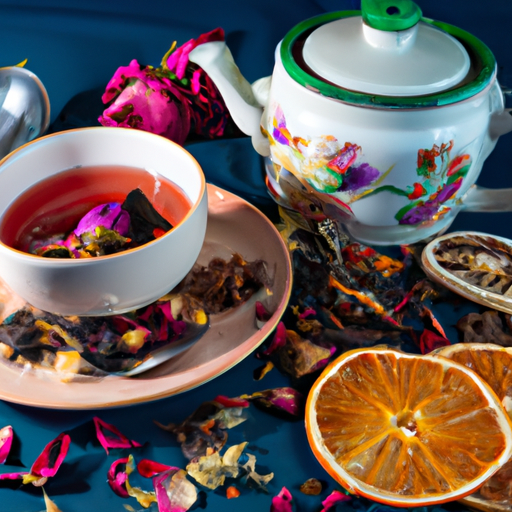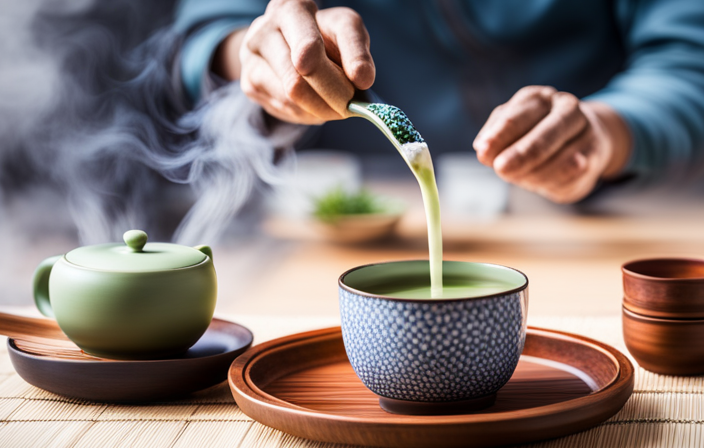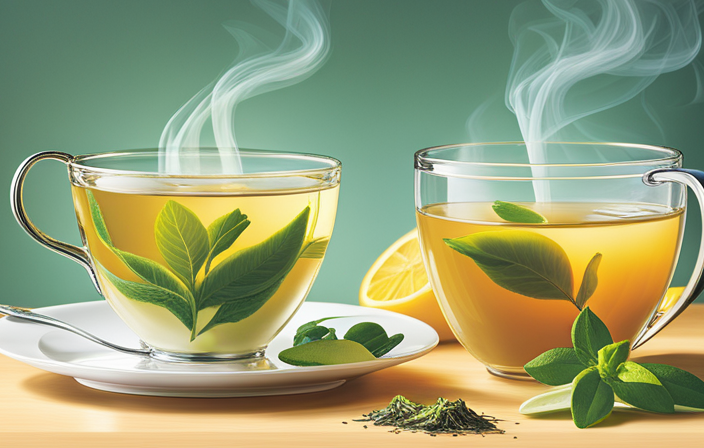Stress Relief and Tea: A Soothing Combination
Feeling overwhelmed? Need a moment to unwind? Look no further than the soothing combination of stress relief and tea.
It may sound too good to be true, but science backs it up. With its calming properties and wide variety of options, tea has the power to relax your mind and body.
From green tea to herbal blends, there’s a perfect tea for every type of stress.
So sit back, sip, and let the stress melt away.
Key Takeaways
- Tea, particularly varieties like chamomile, lavender, peppermint, and lemon balm, has calming compounds that promote relaxation and reduce anxiety.
- The antioxidants in tea protect brain cells from oxidative stress and improve mental health, reducing the risk of neurodegenerative diseases.
- L-theanine, an amino acid found in tea, increases alpha brain waves and boosts neurotransmitters like dopamine and serotonin, enhancing cognitive function and attention.
- Personalized tea blends with calming herbs like chamomile, lavender, and lemon balm offer effective stress relief and can be tailored to individual preferences and benefits.
The Power of Tea in Stress Management
You can experience the calming effects of tea when it comes to managing stress. Understanding tea’s role in stress management is essential for those seeking natural remedies. Tea has been enjoyed for centuries and is known to have numerous health benefits. When it comes to stress, tea can be a powerful tool in helping you relax and find inner peace.
Exploring the calming effects of tea, research has shown that certain compounds found in tea, such as L-theanine, can promote relaxation and reduce anxiety. L-theanine is an amino acid that’s found abundantly in tea leaves, especially in green tea. This compound has been found to increase alpha brain waves, which are associated with a relaxed state of mind. Drinking tea can’t only help you unwind but also improve your focus and mental clarity.
Moreover, tea also contains antioxidants that can protect the body from the harmful effects of stress. These antioxidants, such as catechins, can combat the oxidative stress caused by free radicals, which are produced in response to stress. By reducing oxidative stress, tea can help support overall well-being and alleviate some of the negative effects of chronic stress.
Understanding the Science Behind Tea’s Relaxing Effects
To understand the science behind tea’s relaxing effects, it’s important to look at the calming compounds found in tea. One such compound is L-theanine, an amino acid that has been shown to promote relaxation and reduce anxiety.
Additionally, research has found a connection between tea consumption and changes in brain activity, suggesting that tea can have a direct impact on our mood and stress levels.
Tea’s Calming Compounds
Did you know that drinking tea can help you relax and reduce stress because of its calming compounds?
Tea has been enjoyed for centuries not only for its taste but also for its numerous health benefits. When it comes to mental well-being, tea has been found to have a positive impact.
One of the main compounds responsible for tea’s calming effects is an amino acid called L-theanine. L-theanine has been shown to promote relaxation by increasing alpha brain waves and boosting levels of neurotransmitters such as dopamine and serotonin. These neurotransmitters play a crucial role in regulating mood and promoting a sense of calm.
Additionally, tea contains polyphenols, antioxidants that have been linked to improved mental health and reduced stress levels.
Brain and Tea Connection
Drinking tea can have a positive impact on your brain by increasing alpha brain waves and promoting a sense of calm. Research suggests that tea consumption is associated with various brain health benefits and cognitive improvements. The presence of compounds such as L-theanine and caffeine in tea can enhance cognitive function and attention, leading to improved focus and mental performance.
Moreover, tea’s antioxidants help protect brain cells from oxidative stress and inflammation, reducing the risk of neurodegenerative diseases like Alzheimer’s and Parkinson’s. These cognitive benefits make tea a valuable addition to your daily routine, supporting overall brain health.
As we delve into the benefits of tea for stress relief, it’s important to note the strong connection between brain health and stress management.
Tea’s Stress-Busting Benefits
When life gets overwhelming, taking a moment to enjoy a warm cup of tea can help you relax and find a sense of calm. Understanding tea’s role in reducing stress is important in today’s fast-paced world.
Research has shown that tea contains compounds like L-theanine, which have been found to have a calming effect on the brain. This amino acid increases alpha brain waves, promoting relaxation and reducing stress.
Herbal teas, in particular, have been found to have soothing effects on the body and mind. Chamomile tea, for example, has been used for centuries as a natural remedy for anxiety and insomnia. Peppermint tea is known for its ability to relieve tension and promote relaxation.
Tea Varieties for Stress Relief: Exploring Your Options
You can explore a variety of tea options that are known for their stress-relieving properties. When it comes to tea flavors, chamomile and lavender are popular choices. Chamomile tea has been used for centuries to promote relaxation and reduce anxiety. It contains compounds like apigenin, which has been found to have sedative effects.
Lavender tea, on the other hand, is known for its calming aroma and can help reduce stress and improve sleep quality.
In addition to these floral flavors, you can also try herbal teas like peppermint and lemon balm. Peppermint tea has a refreshing taste and can help relax muscles and alleviate tension. Lemon balm tea has a mild citrus flavor and is known for its calming effects on the nervous system.
When it comes to tea brewing techniques, it’s important to follow the instructions on the packaging to get the best flavor and benefits. Steeping times can vary depending on the type of tea, so make sure to check the recommended brewing time. Using freshly boiled water and allowing the tea to steep for the appropriate amount of time will ensure that you get the most out of your tea.
The Best Herbal Teas for Calming the Mind and Body
If you’re looking for a calming herbal tea, chamomile and lavender are two great options to consider. These herbal teas have long been used for their relaxing properties and are known to promote a sense of calm and tranquility.
Here are three reasons why chamomile and lavender herbal teas can be beneficial for your mental health and overall relaxation:
-
Soothing effects: Chamomile tea is known for its calming properties and has been used for centuries to help reduce anxiety and promote better sleep. Lavender tea, on the other hand, has a similar calming effect and can help relieve stress and promote relaxation.
-
Natural remedies: Both chamomile and lavender are natural remedies that have been used for centuries to promote relaxation and reduce stress. They contain compounds that have been shown to have a positive impact on the nervous system, helping to calm the mind and body.
-
Antioxidant properties: Both chamomile and lavender teas are rich in antioxidants, which can help protect the body against oxidative stress and inflammation. This can have a positive impact on mental health and overall well-being.
Incorporating chamomile and lavender herbal teas into your daily routine can be a simple and effective way to promote relaxation and support your mental health. So why not brew yourself a cup and take a moment to unwind and de-stress?
Green Tea: Nature’s Stress Buster
Drinking green tea can provide you with a natural way to relax and unwind after a long day. Not only is green tea a popular beverage, but it also offers numerous benefits for stress relief. Green tea contains a compound called L-theanine, which has been found to promote relaxation and reduce anxiety. This amino acid works by increasing the production of alpha waves in the brain, which are associated with a state of calmness.
In addition to its stress relief properties, green tea is also rich in antioxidants, which can help protect your body against the harmful effects of stress. These antioxidants, known as catechins, have been shown to have anti-inflammatory and neuroprotective effects, further enhancing the stress-reducing benefits of green tea.
So, the next time you’re feeling stressed, consider brewing a cup of green tea and enjoy its soothing effects.
Speaking of natural remedies for anxiety and insomnia, chamomile tea is another popular option.
Chamomile Tea: A Natural Remedy for Anxiety and Insomnia
Are you struggling with anxiety and insomnia? Look no further than chamomile tea, a natural remedy that has been used for centuries to promote relaxation and improve sleep.
Chamomile’s calming effects can help ease anxiety symptoms, allowing you to unwind and find peace of mind. Its aid in sleep disorders makes it a valuable tool for those struggling with insomnia, providing a gentle and natural alternative to pharmaceutical options.
Chamomile’s Calming Effects
You’ll love how chamomile tea can calm your nerves and help you relax. Chamomile has been used for centuries for its health benefits and soothing effects. Here are three reasons why you should try chamomile tea:
-
It promotes better sleep: Chamomile contains compounds that bind to certain receptors in the brain, promoting relaxation and reducing anxiety. This can help you fall asleep faster and improve the quality of your sleep.
-
It relieves digestive issues: Chamomile has anti-inflammatory properties that can help soothe an upset stomach, relieve indigestion, and reduce bloating. It also acts as a natural remedy for irritable bowel syndrome (IBS).
-
It boosts your immune system: Chamomile tea is rich in antioxidants that help protect your body against free radicals, which can damage cells and lead to chronic diseases. Drinking chamomile tea regularly can help support a healthy immune system.
Incorporating chamomile tea into your daily routine can be as simple as brewing a cup before bed or trying out one of the many delicious chamomile tea recipes available.
Aid for Sleep Disorders
If you’re struggling with sleep disorders, there are various methods that can help improve your sleep quality. One important aspect to consider is sleep hygiene, which involves adopting healthy habits that promote better sleep. This includes maintaining a regular sleep schedule, creating a relaxing sleep environment, avoiding stimulants before bed, and practicing relaxation techniques.
In addition to sleep hygiene, cognitive behavioral therapy (CBT) has been shown to be effective in treating sleep disorders. CBT aims to identify and change negative thoughts and behaviors that contribute to poor sleep. It may involve techniques such as stimulus control, sleep restriction, and relaxation training.
By incorporating these strategies into your routine, you can improve your sleep patterns and enhance overall sleep quality.
Now, let’s delve into the subsequent section about the anxiety reduction properties of tea.
Anxiety Reduction Properties
To reduce anxiety, you can try incorporating certain teas into your daily routine. Tea has been consumed for centuries for its calming properties, and recent research suggests that certain types of tea can help manage anxiety. Here are three teas that may provide natural remedies for stress:
-
Chamomile tea: Known for its soothing effect, chamomile tea has been used as an anxiety management technique for centuries. It contains compounds that promote relaxation and reduce anxiety symptoms.
-
Green tea: Rich in antioxidants and L-theanine, green tea has been shown to have a calming effect on the mind and body. It can help reduce stress and promote a sense of calm.
-
Lemon balm tea: Lemon balm is a herb known for its calming properties. Studies have found that lemon balm tea can help reduce anxiety and improve mood.
Incorporating these teas into your daily routine may provide natural relief from anxiety and help promote overall well-being.
Black Tea: Boosting Energy and Reducing Stress
Black tea can be a great option for boosting energy and reducing stress. If you’re feeling tired or overwhelmed, a cup of black tea might just be what you need. Not only does it contain caffeine to help you stay alert and focused, but it also has a unique amino acid called L-theanine, which has been shown to have calming effects on the mind and body.
Research suggests that black tea can have a positive impact on mental health. A study published in the Journal of Clinical Psychopharmacology found that people who drank black tea experienced a significant reduction in cortisol levels, a hormone associated with stress. Another study published in the journal Psychopharmacology discovered that black tea helped lower self-reported stress levels and improved mood.
In addition to its stress-reducing properties, black tea offers a range of other benefits. It’s rich in antioxidants, which can help protect your body against damaging free radicals. Some studies have also suggested that black tea may have cardiovascular benefits and can help lower the risk of heart disease.
How to Brew the Perfect Cup of Stress-Relieving Tea
When brewing your cup of stress-relieving tea, remember to steep the leaves for the recommended amount of time to achieve the perfect balance of flavor and relaxation. Brewing techniques play a crucial role in extracting the beneficial compounds from the tea leaves and enhancing their calming properties. Here are some tips to help you brew the perfect cup:
-
Use fresh, clean water: The quality of water can greatly impact the taste of your tea. Opt for filtered or spring water for the best results.
-
Choose the right temperature: Different types of tea require different water temperatures. Green and white teas are delicate and should be brewed at lower temperatures, while black and herbal teas can withstand boiling water.
-
Invest in tea accessories: To enhance your tea brewing experience, consider using a tea infuser or a teapot with a built-in strainer. These accessories make it easier to steep the leaves and ensure a smoother infusion.
Tea Rituals: Incorporating Mindfulness Into Your Tea Time
As you savor each sip of your favorite tea, take a moment to fully immerse yourself in the present and appreciate the tranquility it brings. Tea ceremonies have long been practiced as a way to cultivate mindfulness and find inner peace. This ancient tradition, rooted in Eastern cultures, offers a structured ritual that encourages a deep connection with the present moment.
Tea mindfulness, also known as ‘chanoyu’ or ‘the way of tea,’ is more than just a simple act of brewing and drinking tea. It’s a holistic experience that involves a series of intentional actions and rituals. From preparing the tea leaves to serving the tea in a specific manner, each step is performed with utmost care and attention.
The tea ceremony creates a sacred space where you can slow down, let go of distractions, and focus on the present moment. By engaging all your senses, you become fully aware of the aroma, taste, and texture of the tea. The process of observing and appreciating each step of the ceremony allows you to cultivate a sense of calm and inner stillness.
Incorporating tea mindfulness into your daily routine can have numerous benefits for your overall well-being. Research has shown that practicing mindfulness can reduce stress, improve focus, and promote emotional balance. By taking the time to fully immerse yourself in the tea ceremony, you’re nurturing not only your body but also your mind and spirit.
Tea and Meditation: Enhancing Relaxation and Mindfulness
To enhance relaxation and mindfulness, you can create a peaceful atmosphere by dimming the lights and playing soft music while enjoying a cup of tea. This combination of tea and meditation can help you find inner calm and serenity. Tea has been used for centuries as a tool for meditation and mindfulness practices. It provides a sense of comfort and tranquility, allowing you to fully immerse yourself in the present moment.
Here are three ways in which tea can enhance your meditation practice:
-
Tea and Yoga: Before starting your yoga session, take a moment to prepare a cup of tea. Sip on it slowly, allowing the warmth and aroma to soothe your senses. The act of sipping tea mindfully can help you transition from your busy day to a more relaxed state, preparing your mind and body for yoga.
-
Tea and Breathing Exercises: Incorporating deep breathing exercises into your tea ritual can further enhance relaxation. Take a deep breath in, savoring the scent of the tea, and then exhale slowly, releasing any tension or stress. Repeat this process as you sip on your tea, focusing on your breath and the sensations it brings.
-
Tea and Mindfulness Meditation: During your tea meditation, bring your full attention to the experience of drinking tea. Notice the taste, temperature, and texture of the tea. Allow yourself to fully immerse in the present moment, letting go of any thoughts or distractions that may arise.
Tea Blends for Stress Relief: Creating Your Own Calming Concoctions
If you’re looking for a natural way to relieve stress, creating your own tea blends can be a soothing and effective solution.
By combining different herbs and botanicals known for their calming properties, you can tailor the flavors and benefits to your specific needs.
Whether it’s chamomile for relaxation, lavender for calming the mind, or lemon balm for reducing anxiety, experimenting with different combinations can help you find the perfect blend to sip and unwind.
Herbal Tea Benefits
You’ll love the calming effects of herbal tea on your mind and body. Herbal teas, made from various plants and herbs, offer a host of health benefits. Here are three reasons why incorporating herbal tea into your daily routine can be beneficial:
-
Relaxation: Certain herbal teas like chamomile and lavender have natural sedative properties that can help you relax and unwind after a long day. They can promote better sleep and reduce anxiety levels.
-
Digestive health: Peppermint and ginger teas are known for their ability to soothe upset stomachs and aid digestion. They can relieve bloating, cramps, and indigestion, promoting overall gastrointestinal wellness.
-
Immune support: Herbal teas such as echinacea and elderberry are rich in antioxidants and vitamins that can strengthen your immune system. They may help ward off common illnesses and boost your body’s natural defense mechanisms.
Now that you know the benefits of herbal tea, let’s explore some delicious DIY tea recipes to further enhance your relaxation and well-being.
DIY Tea Recipes
Indulge in the delightful flavors of homemade herbal tea blends, created with a variety of aromatic herbs and spices. Making your own tea blends is not only a fun and creative activity, but it also allows you to tailor the flavors and benefits to your specific needs. Whether you’re looking for a soothing blend to calm your mind or an invigorating blend to boost your energy, there’s a DIY tea recipe for every occasion. Here are three simple recipes to get you started:
| Recipe | Ingredients |
|---|---|
| Calming | Chamomile, lavender, lemon balm, mint |
| Energizing | Green tea, ginger, lemon, ginseng |
| Immunity | Echinacea, elderberry, rosehip, hibiscus |
Experiment with different ratios and ingredients until you find your perfect blend. Enjoy the process of creating and savoring these homemade tea recipes that not only taste great but also provide numerous health benefits.
Teas for Different Types of Stress: Finding the Right Match for You
Finding the right tea to match your specific type of stress can greatly enhance your relaxation experience. Whether you’re feeling anxious, overwhelmed, or simply need a moment of calm, there are a variety of teas available that can help alleviate your stress. Here are a few options to consider:
-
Chamomile: Known for its calming properties, chamomile tea can help reduce anxiety and promote better sleep. Its mild, floral flavor is soothing to the senses and can be enjoyed any time of day.
-
Peppermint: If stress has left you feeling fatigued or mentally drained, peppermint tea can provide a refreshing pick-me-up. Its invigorating aroma and cooling sensation can help clear your mind and improve focus.
-
Lavender: Often used in aromatherapy for its relaxation benefits, lavender tea can help relieve stress and promote a sense of tranquility. Its delicate floral flavor is gentle on the palate and can be enjoyed before bedtime to promote better sleep.
To brew these teas, simply steep them in hot water for the recommended amount of time, usually around 5-7 minutes. Experiment with different tea flavors and brewing techniques to find the perfect match for your stress-relief needs.
Frequently Asked Questions
Can Tea Help With Other Health Conditions Besides Stress Relief?
Tea can have positive effects on other health conditions besides stress relief. It has been shown to have an impact on anxiety, helping to promote relaxation and reduce feelings of unease.
Additionally, tea may also have a beneficial effect on blood pressure. Studies have suggested that certain types of tea, such as green tea, can help lower blood pressure levels.
However, it’s important to note that individual results may vary and it’s always best to consult with a healthcare professional for personalized advice.
Are There Any Potential Side Effects or Risks Associated With Drinking Tea for Stress Relief?
When it comes to drinking tea for stress relief, it’s important to be aware of any potential side effects or risks. While tea is generally safe and beneficial, it’s possible to experience some adverse effects. These can include stomach upset, insomnia, and increased heart rate.
Additionally, certain types of tea, like herbal teas, may interact with medications or cause allergic reactions. It’s always a good idea to consult with a healthcare professional before incorporating tea into your stress relief routine.
Stay informed and prioritize your well-being!
How Long Does It Take for Tea to Start Having a Calming Effect?
When you’re seeking a calming effect from tea, it’s natural to wonder how long it takes to kick in. The time it takes for tea to have a calming effect can vary depending on factors like the brewing technique and the type of tea you choose.
Some teas, like chamomile or lavender, may have a more immediate calming effect, while others, like green or black tea, might take a bit longer.
It’s important to find the right tea and brewing method that works best for you.
Can I Drink Tea Before Bed to Help With Sleep?
Drinking tea before bed can indeed help improve sleep quality. In fact, studies have shown that certain types of tea, like chamomile and lavender, have calming properties that promote relaxation and aid in falling asleep faster.
These teas contain compounds that have been found to have a soothing effect on the nervous system.
Are There Any Teas That Should Be Avoided for Stress Relief?
When it comes to stress relief, it’s important to choose the right teas. There are certain teas that you should avoid if you’re looking for stress relief. These teas can actually have a stimulating effect and may increase your anxiety levels.
On the other hand, there are herbal teas that are known for their calming properties and can help reduce stress. So, it’s always a good idea to opt for these herbal teas for maximum benefits.
Conclusion
In conclusion, incorporating tea into your daily routine can be a powerful tool for managing stress. Research has shown that drinking tea can help promote relaxation and reduce anxiety.
In fact, a study conducted at the University of Pennsylvania found that participants who drank chamomile tea experienced a significant decrease in anxiety symptoms.
With a wide variety of tea options available, you can find the perfect blend to suit your needs and enhance your overall well-being.
So sit back, sip your tea, and let the soothing effects wash away your stress.











